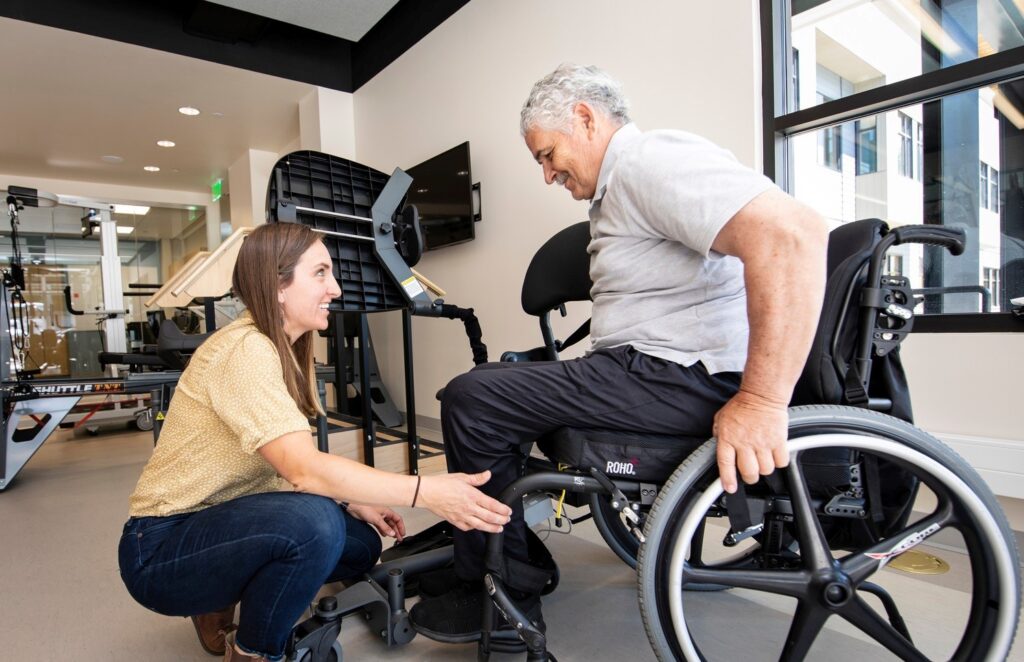Caring About Caregivers
Spinal cord injuries are often the result of a traumatic, sudden event that no one can prepare for. One person is injured and, overnight, a whole family is changed. In what feels like the blink of an eye, family members take on new and wholly unfamiliar roles as caregivers. For most, being there for a loved one is not even a discussion point—it’s a given. However, the shift from partner, sibling, child, parent, or friend to full-time caregiver changes relationship dynamics. There’s a whole new way of life for an individual with a spinal cord injury (SCI) to get used to—and they can’t do it alone.
 That support is so important. In the months following a traumatic injury, care can be needed 24/7. People who take on this critical role for newly dependent loved ones face a steep learning curve, and finding time to give the needed personal and medical care can force a rethink about careers to provide around-the-clock assistance.
That support is so important. In the months following a traumatic injury, care can be needed 24/7. People who take on this critical role for newly dependent loved ones face a steep learning curve, and finding time to give the needed personal and medical care can force a rethink about careers to provide around-the-clock assistance.
The focus is on the person learning to live with SCI, which means the needs of caregivers can be neglected. Too often, the stress, frustrations, and concerns are hidden for fear of impacting others. But, not asking for and receiving the help one may need means the caregiver’s mental and physical wellbeing come second. That leads to a situation that is not healthy for anyone.
For the last 10 years, the Neilsen Foundation’s Psychosocial Research portfolio has funded research that focuses on caregivers and selfcare. The researchers start by asking caregivers about their needs and use that information to design skills-training programs and online educational resources. Emotional support for caregivers and cognitive therapy strategies are also being developed. Some researchers focus on parental caregivers and others on transitions across acute, rehabilitation, and community settings, helping families learn to advocate for the assistance they require. The much-needed acknowledgment that help is well-deserved and available goes a long way in supporting a caregiver’s mental health.
Dr. Susan Charlifue from Craig Hospital in Denver, Colorado, has dedicated much of her career to researching care for family caregivers. She insists providers must look after themselves as well as their loved one with SCI. “These people have a lot of issues, and they neglect themselves far too much, and by neglecting themselves they’re not really helping their loved ones,” she says. “It’s important to acknowledge the work they have to do, and they have to acknowledge it’s fine to cry, it’s fine to say no, and it’s OK to ask for help.” She notes that for some caregivers, a simple “thank you” is reward enough.
Help can also be found online via resources listed at the Christopher & Dana Reeve Foundation and FacingDisability, and in peer groups, such as United Spinal’s Wives and Girlfriends of Spinal Cord Injuries. But some families find solutions by hiring paid caregivers.
COVID compounded the issue, making it incredibly scary to bring people and supplies into homes. This left many families and “friend bubbles” fending for themselves, yet still needing support. If you were able to hire assistance, qualified professional home healthcare workers became scarce.
To solve this problem, Neilsen Foundation grantee partner Rochester Spinal Association recently created a Service Coordinator position to help individuals with SCI find the care they need.
“There’s not enough people to help,” Executive Director Chris Hilderbrant states. “There are programs that pay for personal care, but they don’t pay very well. We need society to respect personal care as a career and pay the folks better, giving them better benefits… They’re not just homecare workers. We need to make these careers a lot more desirable.”
The Foundation understands that everyone across the caregiving spectrum needs support, and funds those seeking to identify the best ways to help. We would like to follow the lead of our partners and applaud the work of those who provide the care.